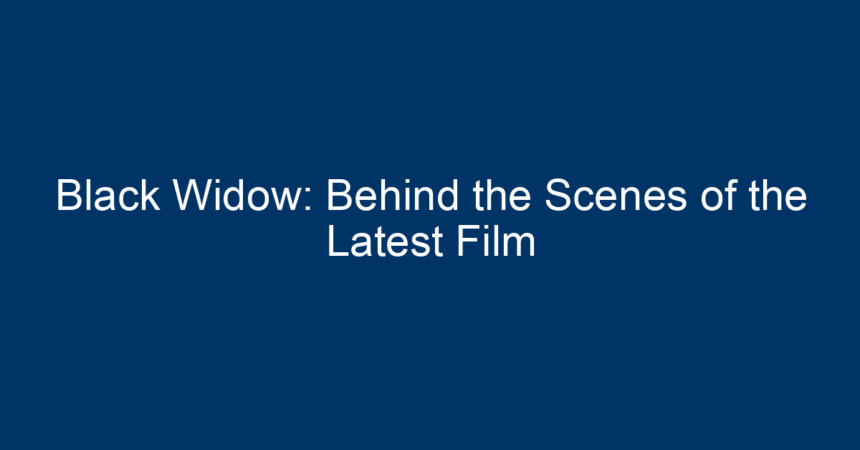The Marvel Cinematic Universe (MCU) has captivated audiences worldwide, and one of its most compelling characters, Natasha Romanoff, better known as Black Widow, takes center stage in her long-awaited solo film. “Black Widow,” released in July 2021, not only explores Natasha’s enigmatic past but also pays homage to the character’s complex evolution throughout the franchise. This article dives deep into the behind-the-scenes aspects of the film, uncovering insights about the storyline, cast, production, and impact, while offering action-oriented insights for fans and aspiring filmmakers alike.
The Storyline: A Glimpse into the Past
The narrative of Black Widow is set between the events of Captain America: Civil War and Avengers: Infinity War. This timeline creates a unique backdrop for discovering Natasha’s roots. The film follows her as she confronts her violent past, grappling with her time in the Red Room, a secret training program that produced some of the world’s deadliest assassins.
Key Plot Points
- Family Dynamics: Natasha’s relationship with her surrogate family—Yelena Belova, Melina Vostokoff, and Alexei Shostakovich—provides a rich emotional core.
- The Red Room: The film dives deep into the operations and moral complexities of the Red Room, unveiling a darker side of the MCU.
- Red Guardian: David Harbour’s portrayal of Alexei, the Red Guardian, adds a layer of charm and humor, balancing the film’s heavier themes.
Casting: The Heart of the Film
A significant aspect of Black Widow is its stellar cast. Scarlett Johansson reprises her role as Natasha Romanoff, a character she has embodied since her MCU debut in 2010. Alongside her, Florence Pugh shines as Yelena Belova, bringing a fresh perspective to the narrative.
Notable Cast Members
- Scarlett Johansson (Natasha Romanoff): Johansson’s commitment to her character shines through, mastering both the emotional and action-heavy scenes.
- Florence Pugh (Yelena Belova): Pugh invokes both wit and depth, establishing herself as a formidable successor to Black Widow.
- David Harbour (Alexei Shostakovich): Harbour’s captivating performance infuses humor and gravitas to the character.
- Rachel Weisz (Melina Vostokoff): Weisz brings nuance to her role as a former Black Widow operative, highlighting the film’s complex female relationships.
The chemistry among the cast is palpable, contributing to the film’s emotional resonance.
Director and Crew: Shaping the Vision
Directed by Cate Shortland, Black Widow marks a significant achievement in the MCU by bringing a female director’s perspective to the forefront. Shortland’s vision encapsulates the intricacies of Natasha’s character and her journey toward redemption.
Behind the Lens
- Story Development: The screenplay, co-written by Eric Pearson, blends action with heartfelt storytelling, ensuring that even the most explosive scenes are grounded in character development.
- Cinematography: The film showcases stunning visuals, thanks to cinematographer Gabriel Beristain, who captures both the action-packed sequences and the quiet, intimate moments essential to Natasha’s story.
Shortland’s directorial choices emphasize the film’s overall tone, seamlessly merging action and emotional depth that sets Black Widow apart from its predecessors.
Action and Stunts: The Heart-Pounding Sequences
One of the standout aspects of Black Widow is its exhilarating action sequences. The choreography and execution of stunts highlight the physicality of the characters and the stakes of their missions.
Stunt Coordination
- Expert Team: Led by stunt coordinator and fight choreographer, Phillip J. Silvera, the team crafted intricate fight scenes that reflect Natasha’s training and agility as a spy.
- Practical Effects: The film utilizes a balanced mix of practical stunts and CGI, creating a more immersive experience for the audience. This approach heightens the authenticity of the action and enhances the visceral impact of each fight.
Charismatic action sequences include a breathtaking chase scene in Budapest and a gripping final confrontation with Taskmaster, another pivotal character.
Themes: More Than Just a Superhero Film
While Black Widow undeniably features explosive action and stunning visuals, its themes resonate on a deeper level. The film explores issues of identity, trauma, and the search for belonging, making it relatable to a broad audience.
Exploring Identity
Natasha’s struggle with her past and the implications of her choices evoke a journey of self-discovery. Through her interactions with Yelena, the film also prompts viewers to reflect on the impact of familial relationships, both biological and chosen.
Feminism in the MCU
Long overdue, Black Widow offers a nuanced portrayal of women in superhero narratives, breaking away from traditional tropes. The film showcases strong, multidimensional female characters who are more than just sidekicks or love interests.
Cultural Impact: A Turning Point for the MCU
Black Widow is more than just a film; it represents a pivotal moment for the MCU. By focusing on a deeply flawed yet strong female character, it sets a precedent for future stories in the franchise.
Box Office and Reception
Upon its release, Black Widow garnered impressive box office numbers, with both critics and audiences praising its storytelling and character development. The film’s success has opened doors for more female-led stories in the MCU and the broader cinematic landscape.
Conclusion: What’s Next for Black Widow?
As we reflect on Black Widow, it’s clear that the film is a celebration of its protagonist’s journey while also setting the stage for new narratives within the MCU. The emergence of characters like Yelena Belova promises exciting possibilities ahead, potentially paving the way for fresh storylines and dynamic character arcs.
Actionable Insights for Fans and Aspiring Filmmakers
- Explore Character Depth: Whether you are a fan or an aspiring filmmaker, consider what makes characters relatable. Dive into their backgrounds and motivations.
- Balance Action and Storytelling: Successful films don’t just rely on action; ensure that your narrative is grounded in emotional truth.
- Champion Diversity: Representation matters in storytelling. Support and promote stories that highlight diverse voices and perspectives.
Black Widow is a monumental addition to the MCU and a testament to the power of storytelling that prioritizes character-driven narratives. As we look to the future, let this film inspire us to seek out stories that not only entertain but also challenge and resonate.




